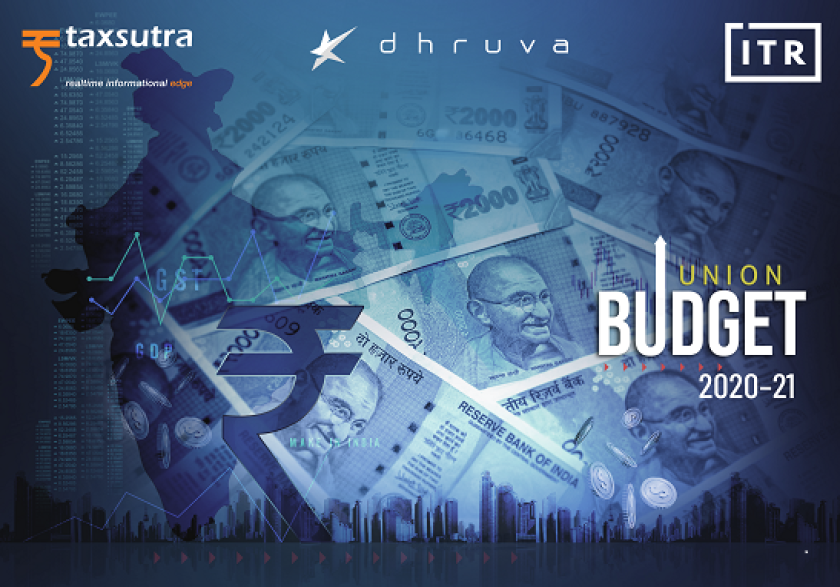Watch now: India Union Budget 2020-21 analysis presented by Dhruva Advisors, Taxsutra and ITR
The Union Budget for the fiscal year 2020-21 was presented in the Parliament on February 1 2020. It is now pending approval from both the Houses and the President. Several changes have been proposed on the direct tax front, of which a significant few are discussed below.
Taxation of dividend income
Under the current regime, an Indian company distributing dividends is required to pay dividend distribution tax (DDT) at 15% (plus applicable surcharge and cess) on the gross amount distributed. Consequently, the dividend income was exempt in the hands of the recipient shareholder. However, resident non-corporate taxpayers were subject to an additional tax at 10% (plus applicable surcharge and cess) on dividends received in excess of INR 1 million. The Finance Bill 2020 (Bill) proposes to abolish DDT and levy tax only on the recipients of dividend income at the applicable rates. For non-resident shareholders, dividend income will taxable in India at 20% (plus applicable surcharge and cess), subject to the beneficial rates, if any, are available under the applicable tax treaties.
Inter-corporate dividends received by a domestic holding company from another domestic company (and not a foreign subsidiary) is exempt to the extent of declaration by the domestic holding company. No deduction is allowed from the dividend income other than interest expense capped up to 20% of the dividend income.
Amendments to provisions relating to international taxation
In light of the ongoing discussions as part of OECD BEPS project, the existing provisions relating to the ‘Significant Economic Presence’ (SEP) are proposed to be deferred and will now apply from the financial year 2021-22 and onwards.
The Bill proposes to widen the scope of income attributable to business operations in India, including an SEP, to cover:
• Income from advertisement targeting an Indian resident customer / customer accessing the advertisement through an internet protocol address located in India.
• Income from sale of data / sale of goods and services using data collected from an Indian resident / any person using an IP address located in India.
Aligning purpose of entering into tax treaties with MLI
The Bill proposes to amend the domestic law to provide for entering into tax treaties which incorporate anti-abuse measures, to deter from creating opportunities for non-taxation or reduced taxation through tax evasion or avoidance, inter alia through treaty shopping arrangements. This is planned in line with the provisions of the multilateral instrument (MLI).
Transfer pricing
Provisions relating to the limitation of interest deduction are proposed to be amended to exclude a permanent establishment in India of a non-resident engaged in the banking business. It is also proposed to amend the provisions relating to dispute resolution proceedings to give the right to approach to the Dispute Resolution Panel to all non-residents which was earlier available only to a foreign company. A non-resident earning income through a business connection in India, is also now eligible to apply for the safe harbour provisions and enter into advance pricing agreements.
Widening the scope of withholding tax of e-commerce transactions and sale of goods
The Bill proposes that an e-commerce operator will be required to withhold tax on amount (exceeding INR 500,000) paid to a domestic e-commerce participant at the rate of 1% (increased to 5% on failure to furnish Permanent Account Number (PAN) or Aadhar number) of gross amount of sales and/or services. This levy will be in addition to the equalisation levy which is currently leviable on payments made to non-resident, e-commerce operators for online marketing services.
Relaxation in respect of return filing by non-residents
It is proposed to grant exemptions from filing returns of income in India to non-residents whose income comprises of royalty and/or fee for technical services, and whose taxes have been withheld at the rates not less than that prescribed under the domestic law.
Clarity on stay by second appellate authority (Tribunal)
The Bill has also proposed that the Tribunal can grant a stay of demand provided that the taxpayer deposits at least 20% of the amount of tax (including interest, fee, penalty) or provides security of an equal amount. Such a stay will now be available for a maximum of 365 days.
Dispute resolution scheme
A new dispute resolution scheme is proposed to be introduced for appeals pending before any appellate authority, including arbitration. Accordingly, subject to certain conditions, any taxpayer can opt to settle the pending proceedings by paying 100% of the disputed tax amount, excluding any interest and penalty up to March 31 2020.
Benefits to foreign portfolio investors (FPI)
The Bill proposes to exempt Category-I FPIs from the applicability of indirect transfer provisions. Further, concessional withholding tax at the rate of 5% will be applicable on interest earned on investments by FPIs in municipal bonds from April 1 2020 up to June 30 2023.
Determination of residential status
The Bill proposes amendments to the criteria for determining the residential status of an individual. Currently, an Indian citizen or person of Indian origin is considered as a non-resident if his stay in India is less than 182 days. This is proposed to be reduced to 120 days. Furthermore, an Indian citizen, being a non-resident, shall be deemed to be an Indian resident if he is not liable to tax in any other country by reason of his domicile or residence and shall be subject to tax in India. Certain clarifications and amendments are expected to define the exact scope of this proposed amendment.
Tax charter
With a view to strengthen the trust between taxpayers and tax authorities, a taxpayer’s charter is proposed to be included in the law which will enumerate taxpayer’s rights clearly.
Rishi Kapadia
T: +91 22 61081055
E: rishi.kapadia@dhruvaadvisors.com
Shruti Lohia













